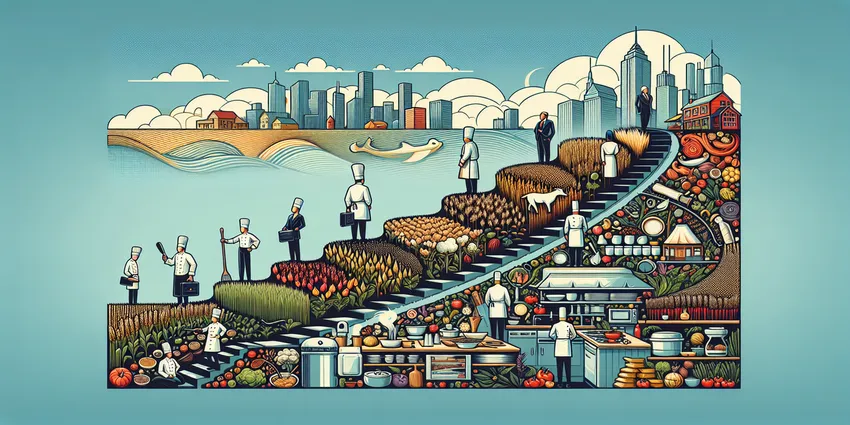Chef Career Progression Roadmap: Key Takeaways
- A typical chef career progresses from Commis Chef to Executive Chef, requiring 1-15 years of experience.
- Salaries vary widely: €10,000–€20,000 for entry-level to €30,000–€80,000 for senior chefs in Europe.
- Specializations, certifications, and location strongly impact career advancement and pay.
This article outlines the key stages in a chef's career, from entry-level roles to senior leadership positions in the kitchen.
Discover how culinary skills, management responsibilities, and salary evolve along the journey to becoming a senior chef. To assist with developing your career, check out our chef career guide for a comprehensive overview.
1. Commis Chef: Entry-Level Role in Chef Career Progression
The Commis Chef represents the foundational stage for any aspiring chef. Often considered a junior-level role, this position involves assisting more experienced chefs by handling essential kitchen tasks.
Responsibilities typically include chopping vegetables, preparing basic ingredients, and maintaining kitchen cleanliness. These duties are critical for smooth kitchen operations and help the Commis Chef learn fundamental culinary techniques.
Most Commis Chefs accumulate between 1 to 3 years of experience during this stage. Salaries in Europe generally range from €10,000 to €20,000 annually, reflecting the entry-level nature of the work. For more details on the role, see our Commis Chef job description.
2. Chef de Partie: Mid-Level Advancement in Chef Career Progression
After gaining experience as a Commis Chef, the natural next step is the Chef de Partie role, also known as a Station Chef. This mid-level position offers an opportunity to specialize by managing a particular kitchen section, such as the grill, sauté, or pastry station.
Beyond preparing dishes within their station, Chef de Parties supervise junior staff, ensuring that the work meets both quality and timing standards. This role is crucial for developing leadership skills alongside cooking expertise.
Typically requiring 3 to 4 years of experience, Chef de Partie salaries in Europe range significantly, from €22,000 to €58,000 annually, depending on location, establishment, and expertise. Learn more about this role in our Chef de Partie job description.
3. Sous Chef: Senior Leadership in Chef Career Progression
The Sous Chef is the second-in-command in a kitchen and a critical player in daily operations. This senior-level role commands responsibilities such as overseeing kitchen staff, assisting with menu planning, and ensuring workflow efficiency.
Progressing to Sous Chef usually requires around 5 to 10 years of culinary experience, encompassing both technical skill and managerial capability. Tips for excelling in this role can be found in our Sous Chef interview questions.
In Europe, Sous Chefs can expect salaries ranging widely between €30,000 and €80,000 annually. This reflects the elevated responsibilities and influence this position has within kitchen operations.
4. Head Chef/Executive Chef: Top of Chef Career Roadmap
The pinnacle of a chef’s career path is reaching the position of Head Chef or Executive Chef. This role carries the ultimate responsibility for kitchen performance, including menu creation, supervision of all staff, budgeting, and maintaining culinary excellence.
Typically, chefs need 8 to 15 years of experience to qualify for this leadership role, combining deep culinary knowledge with strong management skills. Explore our comprehensive Executive Chef job description for insight into these duties.
Salaries at this senior level in Europe range between €30,000 and €80,000 annually, varying based on the size and prestige of the establishment. For recruitment strategies and more, see How to hire top chef for your kitchen.
Additional Considerations for Chef Career Progression
Beyond the classic kitchen hierarchy, chefs have options to tailor their careers through specialization. Areas such as pastry, seafood preparation, or ethnic cuisines provide opportunities to deepen expertise and possibly increase earning potential.
Acquiring certifications from prestigious culinary institutions can also boost credentials and open doors to advanced positions, often leading to enhanced salaries and responsibilities.
Location plays a significant role in career progress. Salaries and advancement timelines can vary dramatically between countries and types of establishments, from boutique restaurants to large hotel kitchens. See our spotlight on Las Vegas restaurants where chefs can earn more to understand location impacts.
Building a Successful Chef Career Through Skills and Leadership
Progressing through a chef's career road map requires more than cooking skills—it demands strong leadership, adaptability, and a passion for continuous learning.
Early stage chefs focus on mastering culinary basics and efficient kitchen practices. As they climb the career ladder, managerial abilities such as staff training, budgeting, and menu innovation become essential.
Seasoned chefs often mentor juniors, fostering a collaborative kitchen culture while maintaining high standards. Learn about key Sous Chef skills to have that support leadership growth.
Resources for Chefs to Support Career Development
Chefs seeking to develop their careers can find valuable information and support through professional organizations and government resources. These often offer certification programs, networking, and the latest industry insights.
- American Culinary Federation (ACF) — Offers certification and professional development for chefs.
- U.S. Bureau of Labor Statistics - Occupational Outlook for Chefs — Provides data on employment trends, salaries, and job outlook.
- National Restaurant Association — Offers industry updates, educational resources, and career tools.
Also consider our career overview on the Pastry Chef role for chefs interested in specialization.
Chef Career Progression Roadmap: Summary and Next Steps
A chef’s career typically evolves through defined stages—from Commis Chef to Executive Chef—each with its own responsibilities, challenges, and rewards.
Advancement depends on developing not only culinary skills but also leadership, specialization, and sometimes formal certifications.
By understanding this roadmap and utilizing available resources wisely, aspiring chefs can strategically navigate their career paths towards senior kitchen management and personal fulfillment. For employers interested in expanding their kitchen teams, consider our guide to hiring reliable kitchen staff.










Loading comments...